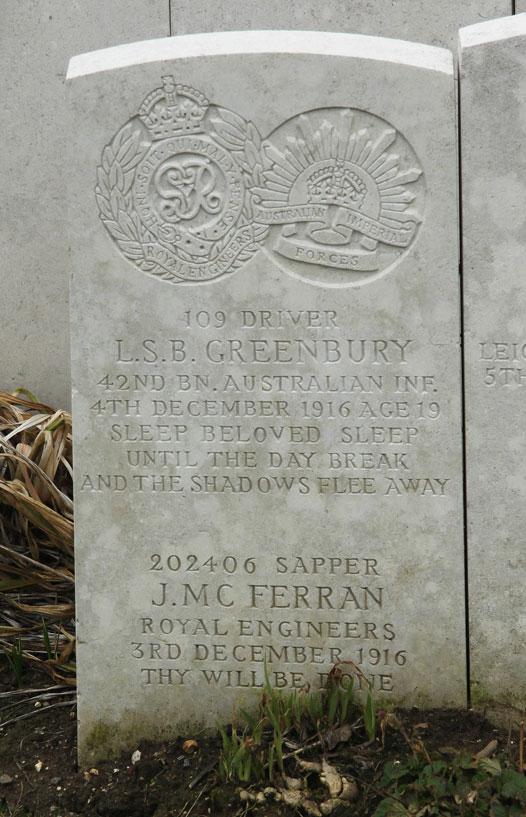![]() In memoriam
In memoriam ![]()
Sapper William James McFerran
William James McFerran (also known as James McFerran) was born on 15 September 1877 at 34 Walton Street, Belfast, the second of at least five children of labourer (later spinning master) James McFerran and his wife Isabella (née Weekey). His mother died when he was just nine years old.
On 5 April 1900 at Belfast, McFerran enlisted in the 54th (Belfast) Company of the Imperial Yeomanry (No.11115). He gave his occupation as 'sorter's clerk'. Ten days later he embarked for South Africa with his Company, returning home on 20 April the following year with the rank of bugler. While serving overseas he had lost one of his right-hand fingers. On 24 June 1901 he was discharged as medically unfit.
By 1903 McFerran was living at 41 Hillview Street, Belfast, and working as a 'preparing master'. On 29 April that year he married Elizabeth Kathleen Boyd at St Ann's Church of Ireland Parish Church, Belfast. The couple had three children over the next thirteen years. By the time of the 1911 Census the family was living at 36 Foyle Street, Belfast, William working as a 'sorters clerk'.
McFerran enlisted in the North Irish Horse at Belfast on 13 August 1914 (No.1003), understating his age by eight years. Within days, on 20 August, he embarked for France with C Squadron and was promoted to trumpeter. He saw action on the retreat from Mons and advance to the Aisne. On 1 September he was posted as missing, but rejoined the squadron soon after.
On 4 November 1914 he faced a field general court martial, charged with being drunk while on active service. He was sentenced to 120 days' imprisonment with hard labour, and demoted to the ranks.
McFerran rejoined the regiment following his release from prison at Le Havre on 3 March 1915, but following a number of illnesses, on 2 April was evacuated to England, where he was admitted to a hospital in Leeds.
On 7 May 1915 he was discharged 'his services being no longer required' (paragraph 392(xxv), King's Regulations).
McFerran re-enlisted on 14 September 1916 at Belfast, this time in the Inland Water Transport Section of the Royal Engineers (No.202406). He gave his address as 240 Sandbrook Cottage, Sydenham, Belfast, his age as 37, his trade as 'fitter', and stated that he had no prior military service.
McFerran embarked for France on 21 November 1916. Twelve days later, however, he committed suicide. A court of inquiry held at St Omer the following day heard from his comrades that he had been cheerful until the last two days, when he had seemed depressed and troubled. None were aware that he had received any bad news, and he was quite sober at the time of his death. Witness Lucienne Givaudan of 202 Rue Dunkerque, St Omer, stated:
I was coming from the station with my sister Georgette at about 8.20 pm on Sunday the 3rd instant. When we arrived at the Pont du Mathurin I saw an English soldier who was talking to himself. There was no one else on the road, and the soldier first placed one leg over the parapet of the bridge, then the other, and standing, threw himself into the water. I ran to the house of Madame Francois le Ferre, which is next to the Offices of the Inland Water Transport and told her that there was a man in the canal. There was also an English soldier present to whom I explained the matter.
The canal was dragged, but his body was not found until the next day.
Informed of the circumstances surrounding his death, McFerran's widow wrote to the authorities:
I was more than surprised at the verdict brought in, in regards to my Husband's death ... as we had a very happy home life, his only regret being that he had to part from his three little children & me. Just two days before his death he wrote me saying how contented he was and proud to do his bit once more, and hoped to see us all at Christmas.
My husband was so plucky (having been through the Boer War) that I cannot realise that he would do such a cowardly act. Should you find it a mistake in the interests of myself and three little children the youngest being only 4 months old would you let me know. Kindly also let me known if how long [sic] I am to draw allowance.
I also wish to thank you for your sympathy.
In response, the Royal Engineers Records Office stated:
Your husband's late career makes it unlikely that cowardice was the motive for the act. Great sympathy is felt for you in your bereavement.
Sapper McFerran was buried in the Longuenesse (St Omer) Souvenir Cemetery, Pas de Calais, France, grave IV.B.1, sharing the burial plot with a soldier of the Australian infantry. His gravestone inscription reads:
202406 SAPPER
J.MC FERRAN
ROYAL ENGINEERS
3RD DECEMBER 1916
THY WILL BE DONE
Gravestone image kindly provided by Steve Rogers, Project Co-ordinator of the The War Graves Photographic Project, www.twgpp.org.

